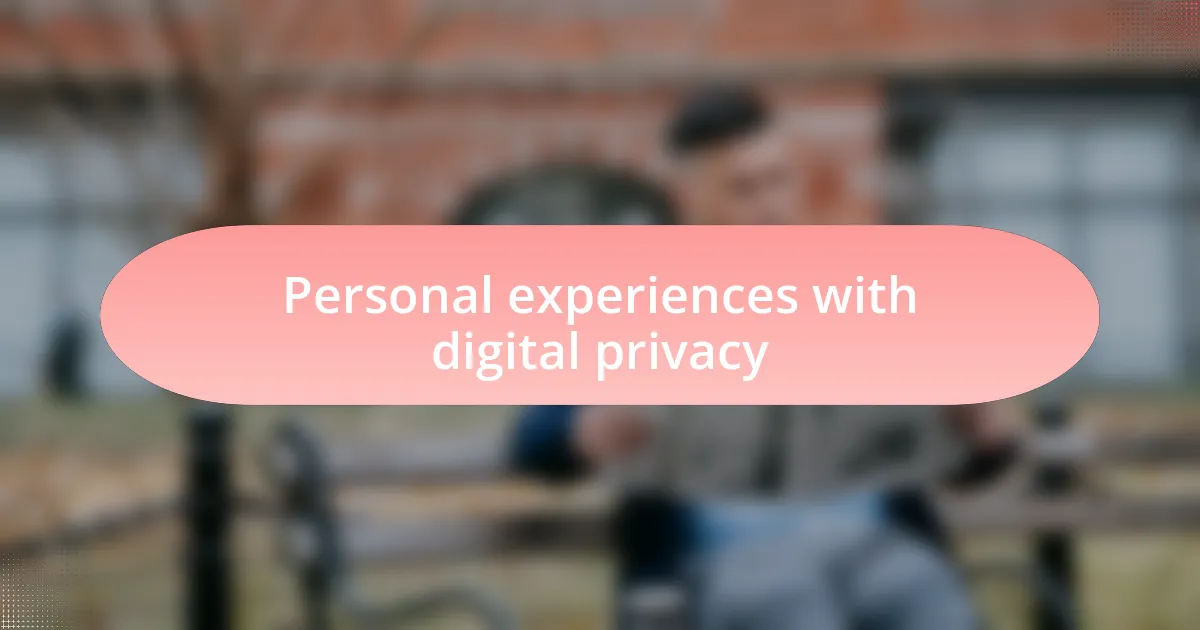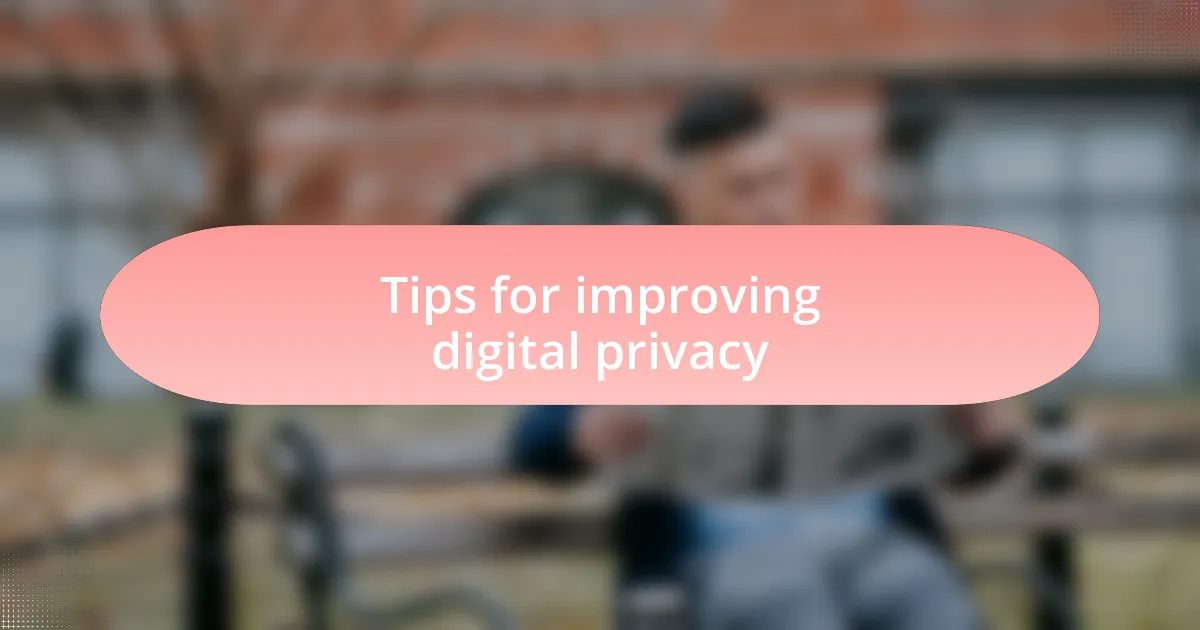Key takeaways:
- Digital privacy is essential for safeguarding autonomy and freedom, with personal data often shared unknowingly online.
- Key legislation in South Africa, like POPIA and ECTA, aims to protect personal data and consumer rights amidst evolving technology.
- Personal experiences, such as phishing attempts and oversharing, highlight the importance of being intentional about online privacy.
- Improving digital privacy can be achieved by reviewing app permissions, using strong passwords, and being cautious with public Wi-Fi networks.

Understanding digital privacy
Digital privacy is not just about data protection; it’s about safeguarding our autonomy and freedom in an increasingly connected world. I remember feeling a sense of vulnerability when I realized how much personal information I had shared online without really thinking about it. Have you ever scrolled through your social media and thought, “What would happen if this information fell into the wrong hands?” It’s a pretty daunting realization, isn’t it?
Understanding digital privacy also means being aware of the digital footprint we leave. Each click, like, and share contributes to a profile that brands and companies use to market products to us. I once inadvertently discovered targeted ads based on a casual mention of my weekend plans to a friend over text. It made me wonder: who else is monitoring my online behavior?
Moreover, digital privacy ties directly into our ability to communicate honestly and freely. I’ve chatted with friends who hesitate to express their opinions online for fear of backlash or surveillance. This raises a critical question: in a world where our voices can be silenced simply by monitoring, how do we ensure our right to speak freely in the digital space?

Legal framework surrounding digital privacy
Digital privacy in South Africa is shaped by several key pieces of legislation. The Protection of Personal Information Act (POPIA), implemented in July 2021, is a significant law that governs how personal data is collected, stored, and processed. I remember the buzz around POPIA when it came into effect; it felt as if the conversation on digital privacy was finally entering mainstream awareness.
Another vital aspect is the Electronic Communications and Transactions Act (ECTA), which provides a framework for electronic transactions and also addresses issues of privacy and security. As I navigated the complexities of online transactions during a recent shopping spree, I became increasingly aware of how these regulations are designed to protect consumer rights. It made me wonder—are these laws enough to keep pace with the rapid evolution of technology and its implications for personal privacy?
Moreover, the legal landscape is ever-changing, influenced by both local challenges and global trends. The recent discussions around data sovereignty and the potential for stricter regulations highlight our need to remain vigilant. Reflecting on my own experiences, I often ask myself: how proactive can we be in advocating for stronger data protection measures while fostering a culture of privacy awareness? It’s a delicate balance, but one we must strive to achieve.

Personal experiences with digital privacy
In my journey through the digital landscape, I’ve encountered moments that have deeply shaped my understanding of privacy. A few months back, I received a message that seemed harmless enough, yet it was a phishing attempt that left me uneasy. The experience jolted me into realizing just how vulnerable my personal information was and how easily it could be exploited. It made me question: how often do we truly think about the safety of our data?
During my time on social media, I often find myself wrestling with the idea of sharing personal experiences while feeling that familiar twinge of hesitation. I once posted a picture that unintentionally revealed my location. When I realized this, I couldn’t shake off the feeling of exposure. Is it worth sharing a slice of my life if it compromises my privacy? These moments have pushed me to be more intentional about what I share online.
When diving into the world of digital privacy, I’ve also had empowering moments that highlighted the importance of protecting my data. I remember the day I finally enabled two-factor authentication on my accounts. It felt like I was taking a positive step towards safeguarding my digital life. The sense of control was revitalizing. This leads me to wonder: how many of us are leveraging the tools available to enhance our privacy? It’s a question worth considering as we navigate an increasingly connected world.

Tips for improving digital privacy
One of the first steps I took to enhance my digital privacy was reviewing the permissions I granted to apps on my devices. Initially, I didn’t think much about it; I just clicked through the prompts. But realizing that some apps were accessing unnecessary information made me rethink my approach. Why do a weather app need my location data all the time?
Another practice that proved invaluable was regularly updating my passwords. I used to have the same password for multiple sites out of convenience, but a friend’s advice changed that for me. Now, I use a password manager, and it feels liberating to know that my accounts are more secure. How often do we prioritize convenience over security?
I also found that being cautious about public Wi-Fi networks significantly improved my digital safety. I once used an unsecured network at a coffee shop, and it dawned on me that I could be placing all my information at risk. Now, I make it a point to use a VPN whenever I connect to public Wi-Fi. Have you considered what could happen if someone intercepted your data while you’re casually browsing the internet? It’s a startling thought that deserves attention.